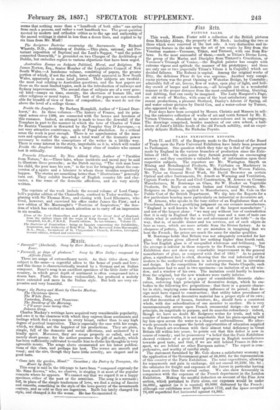Musir.
"Farewell" (Abscheid). Sung by Herr Reichardt; composed by Heinrich Esser.
"Farewell, ye days of gladness." Sung by Miss Dolby; composed by Alfredo Piatti.
These are songs of extraordinary merit. As their titles show, their subject is the same—a regretful adieu to the home of youth and love ; and this theme is characteristically treated by a German and an Italian composer. Ester's song is an excellent specimen of the little lieder of his country, in which great depth of sentiment is often compressed into a dozen bars. Piatti, the famous violoncellist, has produced a melody more extended and more in the Italian style. But both are very expressive and very beautiful.
Songs; the Poetry and Music by Charles Mackay. The Christmas Queen. The White Dove.
Yesterday, Today, and Tomorrow. The Dewdrop of the Morning. "I'll never cease loving thee." Johnnie Gray.
Charles Mackay's writings have acquired very considerable popularity, and owe it to the clearness with which they express those sentiments and feelings which find a response in every breast, rather than to any high degree of poetical inspiration. This is especially the case with his songs, which, we think, are the happiest of his productions. They are plain, simple, full of the domestic and social affections, and animated by a kindly spirit. Moreover' they are songs properly so called, and not merely short poems; for the author possesses the gift of melody, which has been sufficienticultivated to enable him to clothe his thoughts in very agreeable ramie. The songs above enumerated are his latest publications of this class, and perhaps his best. The verses are smooth and vocal; and the airs, though they have little novelty, are elegant and in good taste.
"Come into the garden, Maud." Cavatina ; the Poetry by Tennyson, the Music by Rolfe.
This song is said in the titlepage to have been "composed expressly for Mr. Sims Reeves" who, we observe, is singing it at most of the popular concerts where he appears. We cannot say that we regard it as a happy specimen either of the poet or the musician. The song is a serenade ; but, in place of the simple tenderness of love, we find a string of fancies and conceits, something in the style of the love-poetry of the seventeenth century, and as cold as they are ingenious. Balfe has lately changed his style, and changed it for the worse. He has Germanized it.


































 Previous page
Previous page